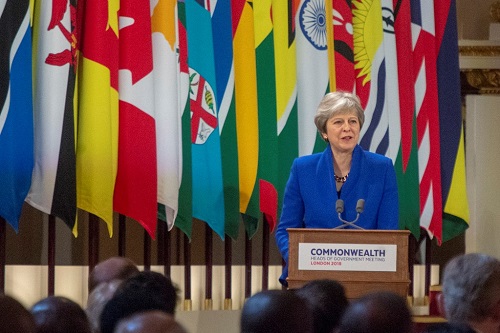Number 10 photo
By
Tom Arms
Ten years ago a Commonwealth-wide poll revealed that support for the political descendant of the British Empire was highest among the developing countries.
Not surprising, they had the most to gain from aid and trade. Support from the developed Commonwealth countries was half of that of the developing world. Britain was at the bottom.
That is changing. Brexiteers have conveniently rediscovered their imperial roots and are now pushing for a revival of the Commonwealth as a replacement for lost European markets. It is, after all, the home for a third of the world’s population and a total GDP of $17 trillion. This may seem like a lot until you compare it to the $60 trillion GDP of the EU.
Nevertheless, the British government has rolled out London’s red carpet for this week’s biennial Commonwealth Heads of Government meeting—usually referred to by the inelegant acronym CHOGM.
But the Brexiteers will find that the former colonies may be reluctant to jump back onto the British wagon. They have long memories. Many still lodge bitter resentment at being left in the lurch when Britain was lured away by the siren call of Brussels.
All of the countries have adjusted to a life without Commonwealth trade preferences. Canada has increased its business with the United States. Australia and New Zealand are now focused on China, Japan and other Asian countries. Singapore has become a Far Eastern entrepôt. The developing countries in Africa, the Caribbean and Pacific have gained access to EU aid and trade.
As one Commonwealth head of government told me: “When the British want us we are expected to jump. When we want them they are too busy to bother.”
Trade will not be the only issue on the table. Climate change, Syria, plastic pollution, cyber security and the election of a new titular head are all on the agenda.
The small island countries are particularly concerned about climate change. Rising Pacific sea levels are polluting fresh water supplies and even submerging entire communities under the waves. In the Caribbean, increasingly extreme weather conditions spawn hurricanes year after year.
Syria is topical. The heads of government cannot avoid discussing the civil war, Russian involvement, and the recent US-led attack following the repeated use of chemical weapons. There will be a condemnation of Bashar al-Assad in the communique.
And with Syria comes the threat of cyber attack. Both the FBI and Britain’s electronic spy agency GCHQ Cheltenham have warned that Russia has been positioning itself for such an attack on the UK—possibly in retaliation for Syria. Through the UK runs a vast network of telecommunications for the Commonwealth and many other countries.
The future used to be plastics. Now the material is damned by environmentalists. It degrades slowly and as it does it releases dangerous chemicals consumed by animals, marine life, birds and eventually—humans. It takes 50 years for a plastic cup to decompose; 450 years for a disposable nappy and 600 years for a fishing line.
Finally, there is the titular job of Head of Commonwealth. Queen Elizabeth has held the job for 75 years. She is now 91. She is tired and her travelling days are over. At the opening ceremony at Buckingham Palace the Queen made a personal plea to the 53 countries to elect her son Prince Charles to fill her shoes.
Her Majesty would not have made a public appeal unless her advisers had told that Charles’s succession was in the bag. To do so without that foreknowledge would have been a total humiliation for the monarchy and Britain. So it is virtually certain that the link between the British monarchy and the Commonwealth will continue.
Whether or not trade and political links will grow is another matter. But the Commonwealth will remain an organisation based on a common past, the rule of law, human rights, belief in the importance of free trade and democratic values. It is also a forum for the exchange of ideas and ideas are the foundation for everything that follows.
Tom Arms
I am a journalist, entrepreneur and historian with extensive experience in print, web and broadcast journalism. I started as a diplomatic correspondent, wrote several books (The Falklands Crisis, World Elections On File and the Encyclopedia of the Cold War), and then in 1987 started my own business (Future Events News Service, www.fensinformation.com) which over 25 years established itself as the world and UK media’s diary. Our strapline was: “We set the world’s news agenda.” I sold FENS in December 2012 but retained the exclusive broadcast rights to all of FENS data. To exploit these rights I set up LookAhead TV which produces unique programmes which “Broadcasts Tomorrow Today” so that viewers can “Plan to Participate.” LookAhead has appeared regularly on Vox Africa, Radio Tatras International, The Conversation and Voice of Africa Radio.
In addition to being a syndicated broadcaster and columnist on global affairs, Tom is also available for speaking engagements and can be contacted on Twitter, Linkedin and email: [email protected].



No Comments Yet!
You can be first to comment this post!